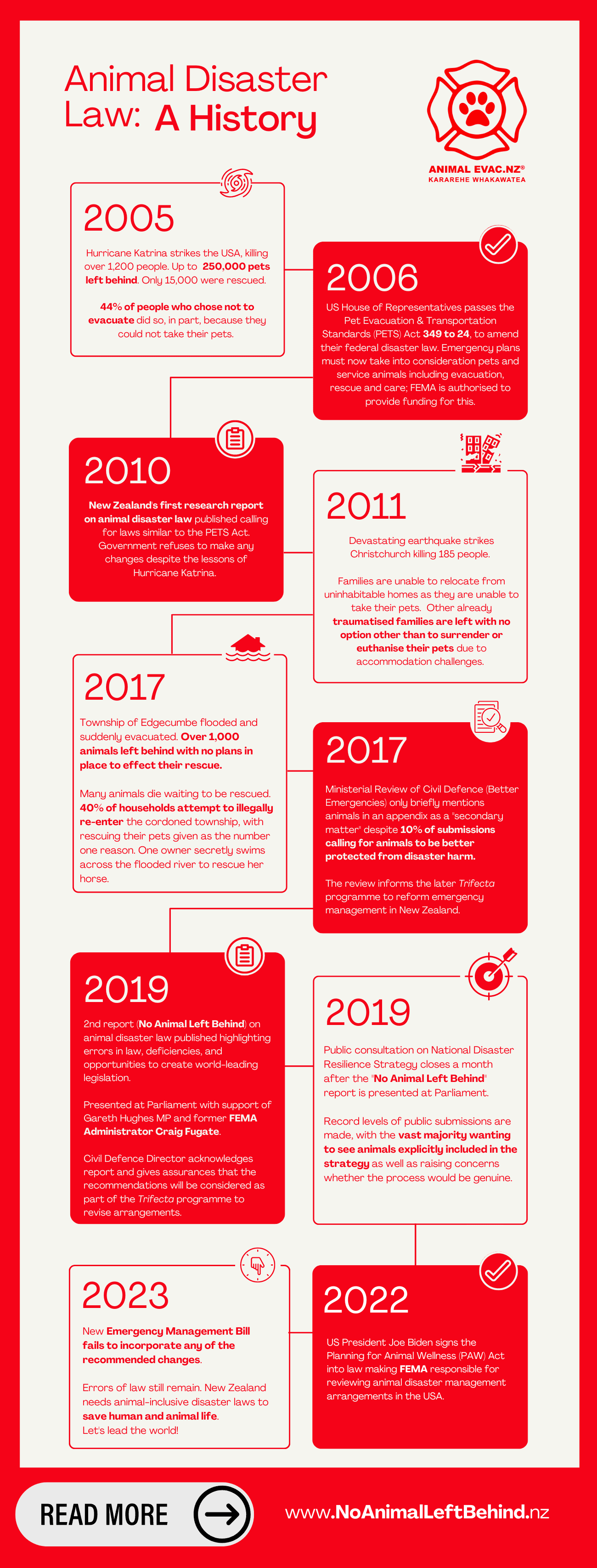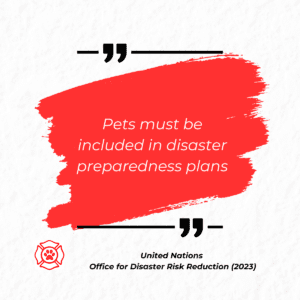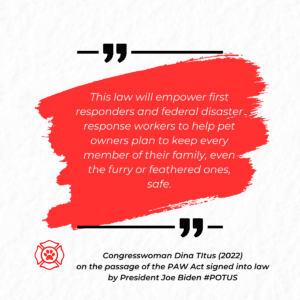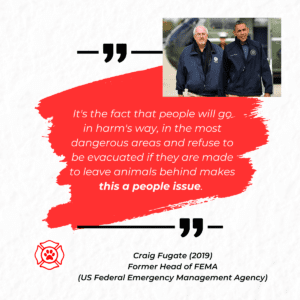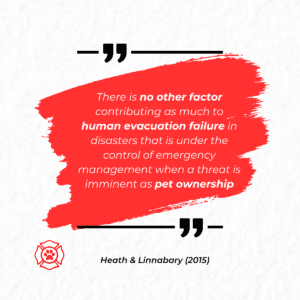
We need a better option! Raise your paw to ensure future emergency management arrangements better protect animals.
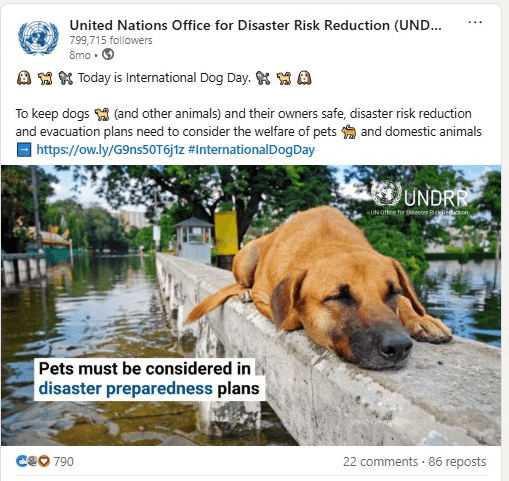
The National Emergency Management Agency has released their Discussion Document: Strengthening New Zealand’s Emergency Management Legislation.
Though we have seen a slight improvement in animals being considered in such reforms, the pleas of citizens are still not being heard and we need you to speak up on the behalf of our furry friends.
You may recall last year that Animal Evac New Zealand mobilised the highest number of public submissions EVER on civil defence emergency management reform, specifically the Emergency Management Bill 2024. We did this by emptying our bank account on the “No Animal Left Behind” campaign, a national digital billboard and online advertising campaign. The opportunity for substantial change to emergency management law usually only presents itself every twenty years or so (Civil Defence Act 1962, Civil Defence Act 1983, Civil Defence Emergency Management Act 2002). Yes, a little charity less than 5 years old with no staff, no buildings, not even a vehicle – but a network of passionate skilled volunteers around the country made this happen (thank you all our volunteers and supporters!).
When a new government came to power late last year after submissions to the bill had closed, the bill was put in the bin and the government announced a new and better bill would be drafted. Assurances were given that it would include the submissions made on the 2024 Emergency Management Bill (hmmm, that is debateable given the peer reviewed study found that over 60% of submissions wanted animals better protected, which was also the number one issue, yet animals were relegated again way down the new discussion document’s focus).
However, the discussion document obfuscates the issues and recommendations made from previous submissions. It gives four options that do not reflect the expectations of citizens. We are now calling for all New Zealand citizens and residents to make a submission to express their thoughts on discussion document. We would encourage that you write an authentic submission, rather than just copying and pasting our submission (that is below for reference). The positive thing is that the consultation process welcomes any alternative options that haven’t been identified (good! because we have some!).
We are advocating that another option is pursued:
Option 5: An “Animal Emergency Management” part in the draft bill is developed that addresses the issues and solutions that have been raised in previous submissions, reports and peer reviewed articles.
Animal Evac New Zealand stands ready to provide direct support to NEMA in drafting this part of the proposed Emergency Management Bill, so that we can use this once in a generation opportunity to create animal-inclusive resilient communities and provide a “gold standard” model act, for other countries to follow – something for all New Zealander’s to be proud of.
So have a read of the NEMA website about the Discussion Document and have your say [click here] before 13 May 2025, and let’s create positive change.
Our bank account is nearly empty, as we put our money where our mouth is – with running last year, the largest animal disaster management advocacy campaign in New Zealand.
So please make a donation to us so we can continue protect animals from disaster harm.
We are still finalising our submission, but to give you steer on what we believe needs to be said, find our draft below:
SUBMSISION ON DISCUSSION DOCUMENT: STRENGTHENING NEW ZEALAND’S EMERGENCY MANAGEMENT LEGISLATION
New Zealand’s efforts to reform its emergency management law have highlighted a persistent gap between public sentiment and legislative action-particularly regarding the protection of animals during disasters. Despite robust public engagement and clear calls for animal-inclusive disaster arrangements, previous consultative processes have repeatedly failed to heed citizen expectations and translate these priorities into law. As the government releases its new discussion document for consultation on emergency management legislative reform there is renewed hope that this democratic deficit will finally be addressed.
Strong Public Support for Animal Protection
Analysis of public submissions on the Emergency Management Bill (2024) demonstrates overwhelming support for embedding animal welfare in disaster law, most importantly in primary legislation. A recent thematic study found that 61% of all submissions raised the importance of including animals in emergency legislation, with nearly half of all submissions directly influenced by our “No Animal Left Behind” campaign. Submitters called for:
These priorities reflect both ethical concerns and practical realities: research from past disasters shows that people often risk their own safety to save animals, and that failing to plan for animals can undermine both human and animal welfare.
Despite the clarity and volume of public input, animal welfare provisions have repeatedly been sidelined or treated as peripheral in legislative drafts and policy documents.
For example, after the 2017 Edgecumbe flood—where nearly 29% of evacuees breached safety cordons to check on or rescue their pets[2]—animal welfare concerns raised in subsequent reviews were relegated to annexes for “future consideration,” rather than being integrated into core recommendations.
The Government’s Latest Discussion Document
The government’s new discussion document acknowledges the high volume of submissions advocating for animal-inclusive disaster law, a positive sign that public voices are at least being recognised. However, past experience suggests caution: previous documents have referenced academic work in passing but have not always engaged with the substance of the evidence or the most comprehensive research in the field despite such research being provided.
The discussion document fails to prioritise the protection of animals in emergency management law as sought by the public through submissions made to the withdrawn 2024 Emergency Management Bill. There appears to be no evidence provided how objectives were determined and or how issues were prioritised using an empirical method.
While the discussion document includes a reference to Glassey’s research, it does not fully reflect the breadth of analysis or the scale of public advocacy documented in recent peer-reviewed studies or the substantive report presented at Parliament in 2019[3]. Nonetheless, the fact that the volume of animal-focused submissions is explicitly noted in the consultation process is a step forward.
As a point of correction, the reference cited in the discussion document is erroneous, as the figure quoted (33% of households had attempted to illegally re-enter the evacuated township of Edgecumbe in 2017) is not from the article referenced, but from the article published in International Journal of Disaster Risk Reduction. This was authored by Glassey, Libergreen, Rodriguez and King as part of a blind peer-reviewed University of Otago study. Though the articled cited does examine the current flaws across the suite of legislation that affects animal disaster rescue in New Zealand, noting none of the legal complexities raised in this 2020 article were addressed in the Emergency Management Bill (2024).
The case for animal-inclusive disaster law is both moral and practical. International experience—from Hurricane Katrina in the US to the Edgecumbe flood in New Zealand—shows that people’s attachment to animals is a critical factor in disaster response. Laws that fail to account for this bond risk not only animal suffering but also human non-compliance with evacuation orders, increased danger, and reduced trust in authorities.
Moreover, there are international best practice examples to draw from like the US Pets Emergency and Transportation Standards (PETS) Act 2006, Planning for Animal Wellbeing Act 2022 and Italy’s Civil Protection Code 2018 These demonstrate that animal-inclusive disaster law is both achievable and able to be integrated into primary disaster management law as a matter of good practice. Other international examples of policy advancement is Animals in Disasters: The need for protection and coordination across Europe, a report submitted to the European Union in 2023 by Eurogroup for Animals.
A Roadmap for Reform
The public has provided a clear roadmap for reform, calling for:
These recommendations are grounded in both lived experience and a growing body of academic research in New Zealand and overseas, including recent thematic analyses of public submissions. It is unclear why the discussion paper does not accurately reflect the depth and breadth of issues raised during the 2024 Emergency Management Bill Select Committee submission process.
Non-legislative levers are demonstrably ineffective. This was discussed in the peer-reviewed article “It was one of the worst days of my life: Companion animal owners’ experiences of the Edgecumbe 2017 flood in Aotearoa New Zealand” (Glassey, Libergreen, Ferrere and King, 2023) with regard to the “Principles of Evacuation”.
Animal Evac New Zealand does not support any of the options as they obfuscate the actual issues and even with Option 4, such powers already exist under the Animal Welfare Act 1999[4]. However, powers pertaining to power to enter property and dwellings, perform rescue of animals, disposal of rescued or presented animals (i.e. rehoming), power to microchip, sharing of microchip records, protection of disability assistance dogs, access to public transportation for the evacuation of companion animals, requisitioning to protect life, funding and accountability of volunteer response organisations[5], along with numerous other legal issues do require attention as previously submitted to the Select Committee on the Emergency Management Bill 2024.
The options provided in the discussion document obfuscates the issues and disregards the options sought by the public and others in the multiple previous consultation exercises on emergency management reform and system improvement.
We submit that when the emergency management bill is redrafted, that a new Part is added, that provides for improved and specific powers, responsibilities, rights and duties with respect to animal emergency management. New Zealand could build on international best practice and legislate and implement a model framework[6] for animal disaster management repositioning New Zealand as a leader in animal welfare and emergency management. This would meet the public’s clear expectations and enhance human and animal wellbeing in emergencies.
As New Zealand prepares a new draft bill, there is hope that this time, the voices of citizens will be reflected in law. The lessons of past failures are clear: meaningful reform requires not just consultation, but genuine responsiveness to public priorities. By embedding animal welfare into disaster law, New Zealand can set a global standard for compassionate, effective emergency management—and restore faith in the democratic process.
Animal Evac New Zealand welcomes direct conversation with NEMA’s emergency management bill project unit to support the development of world leading animal-inclusive disaster law.
Footnotes
[1] The United Nations Office for Disaster Risk Reduction also promotes “Pets must be included in disaster plans”.
[3] This report was championed by Gareth Hughes MP and former FEMA Director Craig Fugate, the later, notably one of the world’s most renown thought leaders on emergency management.
[5] Refer submission made by the Office of the Ombudsman to the Emergency Management Bill 2024.
[6] Refer Page 50.
